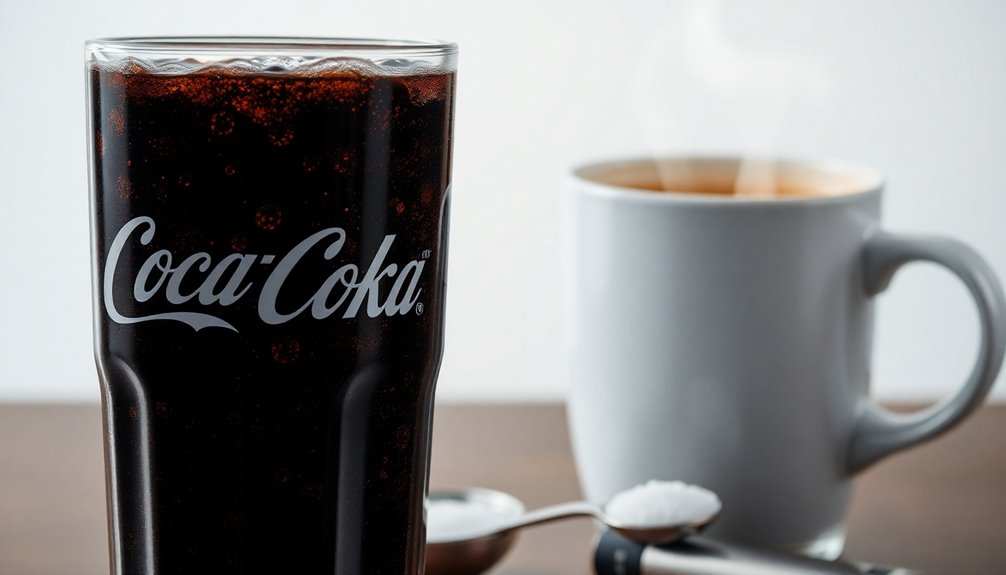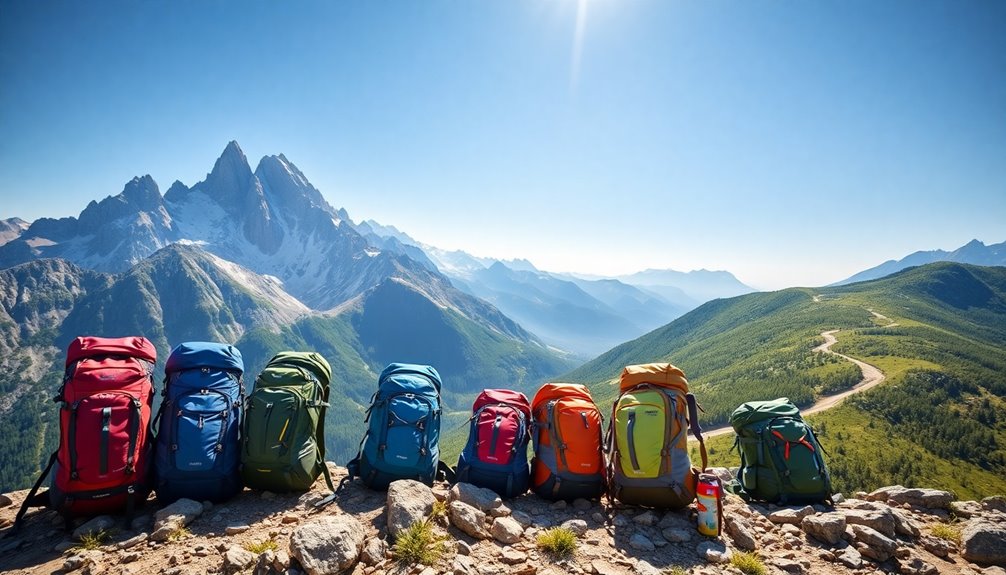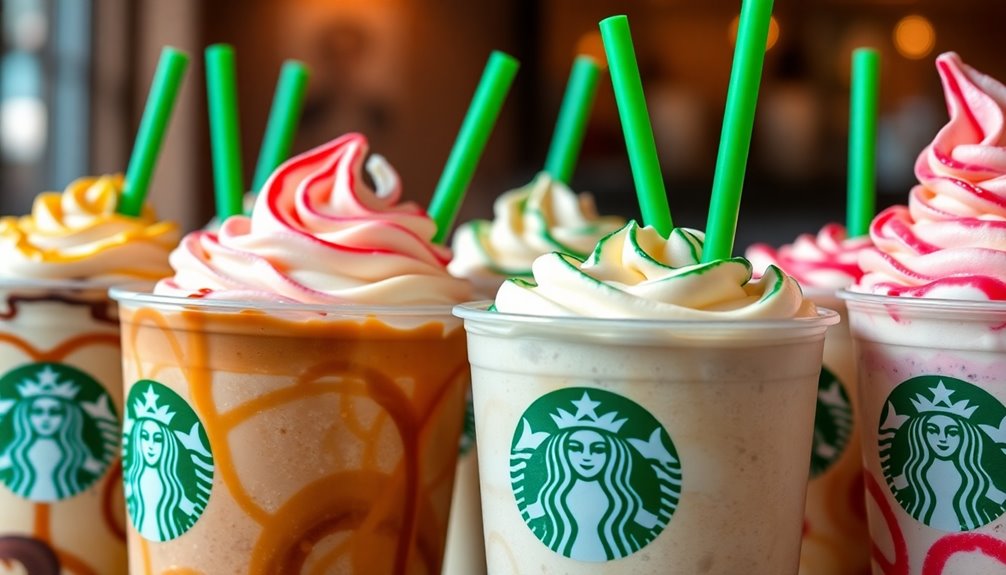Coke Zero offers about 34 mg of caffeine in a 12 oz can, which is less than the roughly 95 mg found in an 8 oz cup of coffee. So, if you're looking for a caffeine boost, coffee definitely packs more punch. Each drink has its charm, though—Coke Zero is sugar-free and calorie-free, while coffee can provide a richer flavor and quicker effects. Both can be enjoyed in moderation, but you might have to sip a lot of Coke Zero to match a single cup of coffee's caffeine kick. If you're curious about caffeine effects, stick around for more info!
Key Takeaways
- A 12 oz can of Coke Zero contains 34 mg of caffeine.
- An 8 oz cup of brewed coffee has approximately 95 mg of caffeine.
- Coke Zero has significantly less caffeine than coffee, which is about 2.8 times more.
- Regular Coca-Cola has 39 mg caffeine per can, slightly more than Coke Zero.
- Both beverages are safe in moderation, with a recommended limit of 400 mg caffeine per day.
Overview of Coke Zero
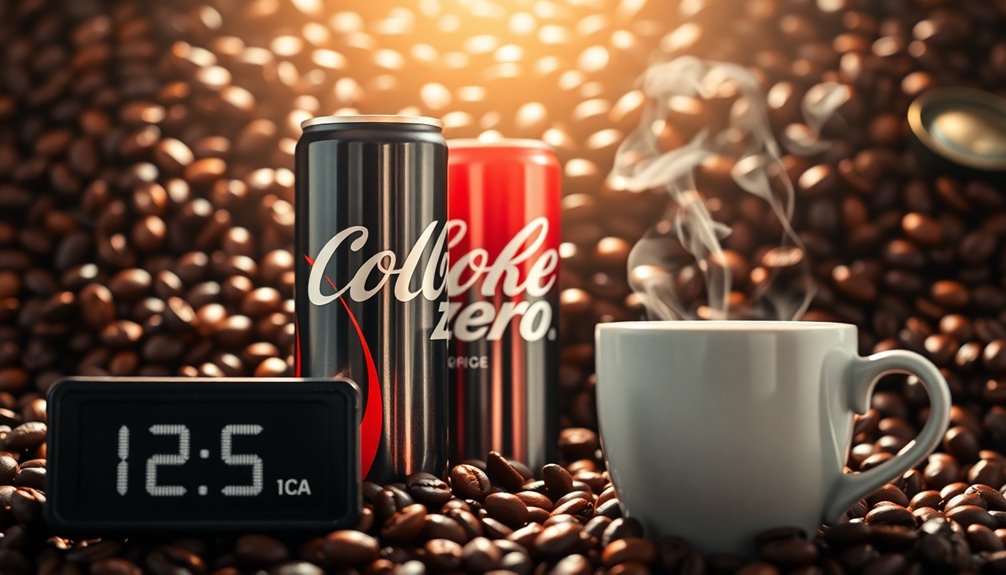
Coke Zero, now known as Coca-Cola Zero Sugar, offers a rejuvenating alternative for those craving the classic taste of Coca-Cola without the calories.
Launched in 2005, it quickly became a favorite among healthy adults looking for low-calorie soft drinks.
With no sugar and sweetened using FDA-approved artificial sweeteners like aspartame and acesulfame potassium, Coca-Cola Zero maintains a taste profile very similar to the original.
A standard 12 oz can contains about 34 mg of caffeine, slightly less than the 39 mg found in regular Coca-Cola. While cola beverages offer a moderate caffeine boost, many consumers seek alternatives in dessert form. Interestingly, the caffeine levels in coffee ice cream can vary significantly depending on the brand and formulation, sometimes exceeding that of a standard can of soda. This makes it an appealing option for those looking to enjoy a sweet treat while still indulging in their caffeine cravings.
Its appeal lies in the combination of 0 calories and moderate caffeine levels, making it a popular choice for those wanting a rejuvenating beverage without the guilt.
Caffeine Content Comparison
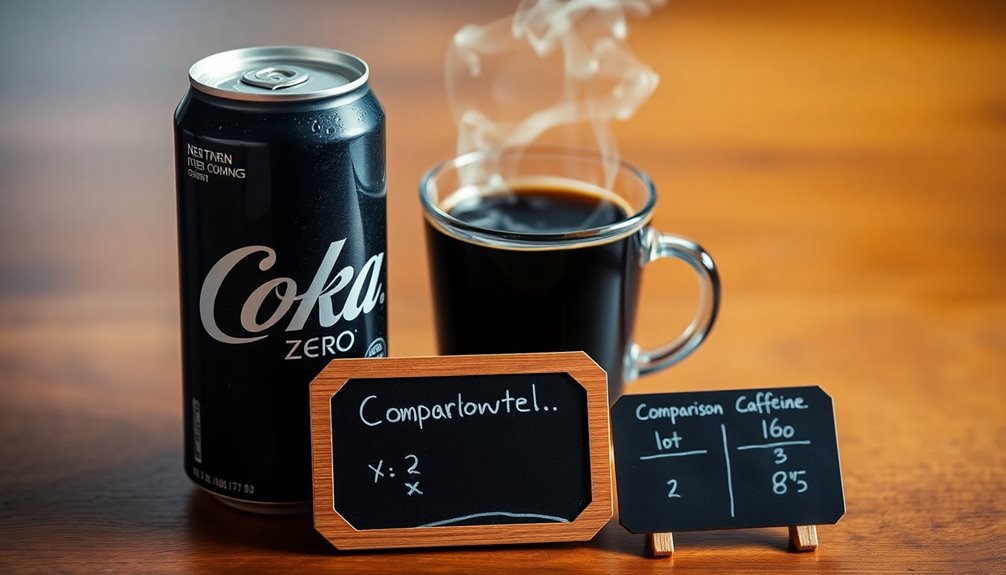
How does the caffeine content in Coke Zero stack up against other popular beverages? A standard 12 oz can of Coke Zero contains about 34 mg of caffeine, which is lower than the approximately 95 mg found in an 8 oz cup of brewed coffee.
Even regular Coca-Cola has slightly more caffeine, at 39 mg per can, while Diet Coke tops it with around 46 mg.
If you're looking for a stronger kick, a double shot of espresso packs between 60 mg to 100 mg in just 2 oz.
Health Benefits of Caffeine
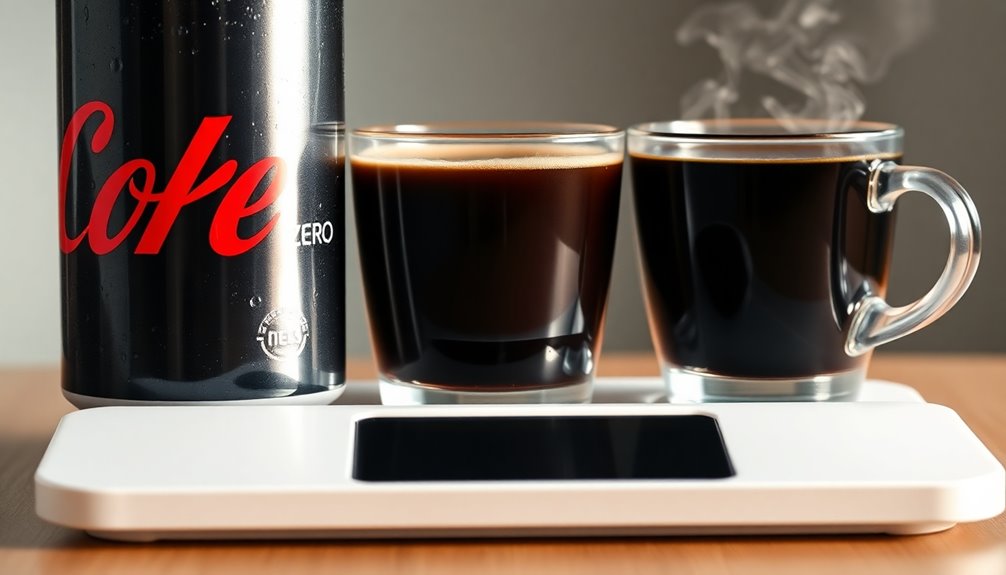
Caffeine's got a reputation for boosting your mood and energy levels when you need it most.
It can also enhance your athletic performance, helping you push through those tough workouts.
Whether you're looking to feel more alert or improve your endurance, caffeine might just be the help you're searching for.
Mood Improvement Effects
While many people enjoy a revitalizing can of Coke Zero, they mightn't realize that the caffeine it contains can greatly enhance their mood.
Caffeine works by blocking adenosine receptors, which helps you feel more alert and boosts your overall mood. Studies show that moderate caffeine consumption, around 200-400 mg per day, can improve mood and cognitive function, making it a go-to choice for mental stimulation.
Additionally, caffeine may lower the risk of depression, as regular coffee drinkers often report fewer depressive symptoms.
Just keep in mind that caffeine affects people differently; some may experience jitters or anxiety.
Enhanced Athletic Performance
Enhanced athletic performance is one of the most notable benefits of caffeine, making it a popular choice among athletes and fitness enthusiasts.
When you consume caffeine, whether from Coke Zero or other sources, you're likely to experience increased endurance, allowing you to exercise longer before feeling fatigued.
Studies show that caffeine boosts reaction times, focus, and alertness during workouts. This can greatly enhance exercise efficiency and help with weight control by promoting fat oxidation.
With the ideal dose typically ranging from 3-6 mg per kilogram of body weight, you can easily achieve this through Caffeine in Coke Zero.
Plus, caffeine stimulates adrenaline release, further improving strength and power output, especially during resistance training. Additionally, engaging in physical activities with educational toys can further support motor skills and coordination, enhancing overall athletic performance.
Side Effects of Caffeine
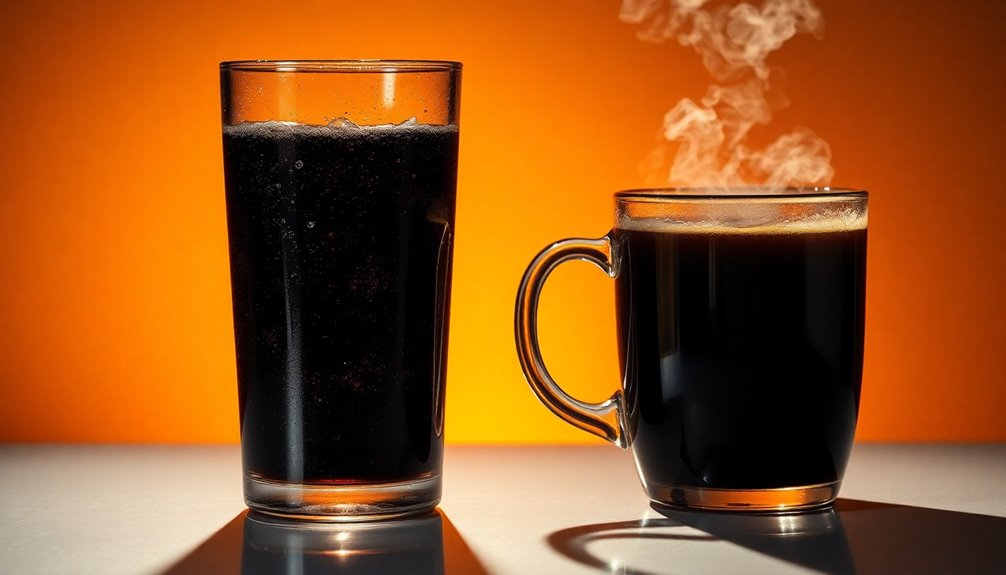
When you consume caffeine, especially in high amounts, you might experience various side effects that can affect your daily life. Excessive caffeine consumption can lead to anxiety, nausea, headaches, and insomnia, particularly if you have individual sensitivity to caffeine.
If you suddenly reduce your intake, you could also face mild withdrawal symptoms like fatigue and irritability. High doses can escalate to severe issues, including increased heart rate and gastrointestinal disturbances.
The FDA suggests a maximum daily caffeine intake of 400 mg for healthy adults to avoid these negative health effects. Remember, everyone's tolerance varies; some might feel side effects with lower doses than others, so it's crucial to pay attention to how your body reacts.
Coke Zero Vs Coffee
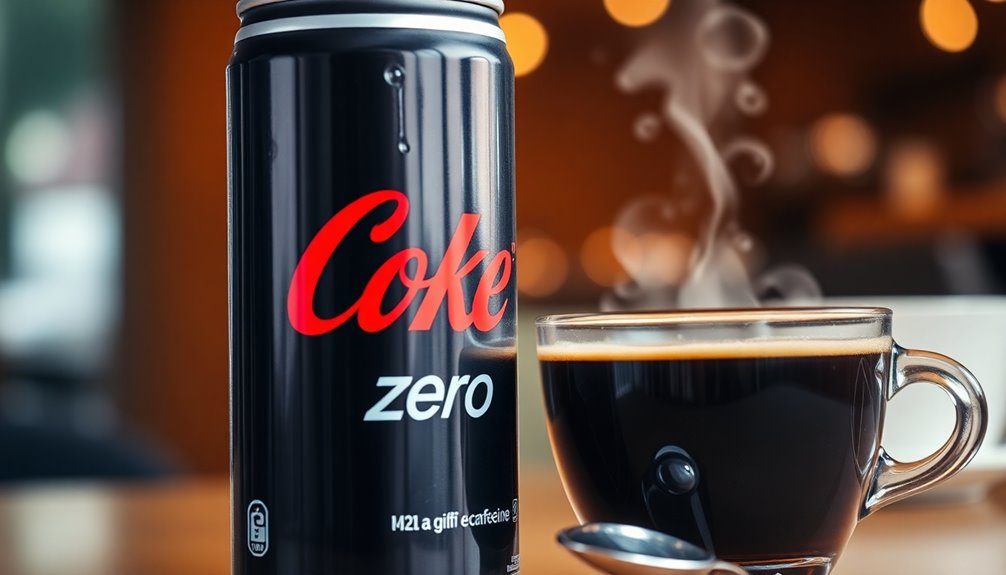
When comparing Coke Zero to coffee, you'll notice a significant difference in caffeine content.
A 12 oz can of Coke Zero has around 34 mg of caffeine, while an 8 oz cup of coffee packs about 95 mg.
This contrast not only affects your caffeine intake but also the potential health effects each beverage may have.
Caffeine Comparison Chart
Coke Zero and coffee offer distinct caffeine experiences, making it important to understand how they compare.
Here's a quick caffeine comparison:
- Coke Zero: A 12 oz can contains about 34 mg of caffeine, lower than Diet Coke's 46 mg and regular Coke's 39 mg.
- Brewed Coffee: An 8 oz cup typically has around 95 mg of caffeine. That's 2-4 times more than Coke Zero!
- Espresso: A double shot (2 oz) packs 60-100 mg of caffeine, showcasing just how much stronger coffee can be compared to Coke Zero.
Health Effects Overview
Although both Coke Zero and coffee are popular caffeinated beverages, their health effects can differ greatly.
A 12 oz can of Coke Zero has about 34 mg of caffeine, which is considerably less than the 95 mg found in an 8 oz cup of brewed coffee. While Coke Zero is marketed as zero-calorie, coffee typically has minimal calories unless you add sugar or cream.
The caffeine from coffee is absorbed more quickly, often providing faster effects compared to the gradual release from Coke Zero. Moderate intake of either beverage is generally safe, with the FDA recommending a daily limit of around 400 mg for most healthy adults.
However, excessive consumption can lead to negative health effects for both drinks. Additionally, the caffeine levels in cocoa vary based on processing methods, which is important to consider for those who enjoy chocolate beverages.
Popular Caffeinated Beverages
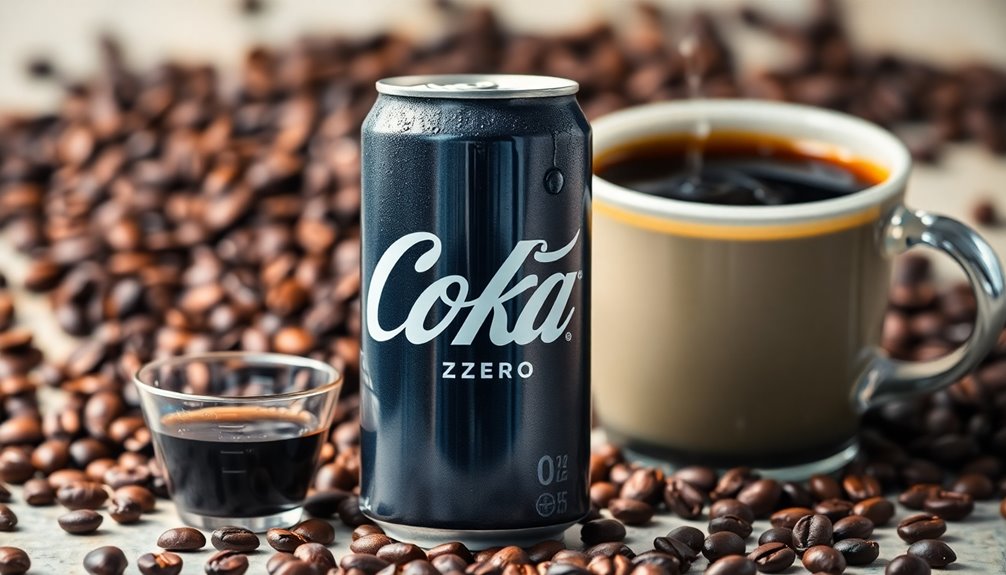
Caffeinated beverages are a popular choice for many looking to boost their energy or enhance focus throughout the day.
While you might enjoy a invigorating can of Coke Zero, it contains about 34 mg of caffeine, considerably less than coffee.
Here's a look at some other popular caffeinated beverages:
- Coffee: An average 8 oz cup contains around 95 mg of caffeine.
- Diet Coke: A 12 oz can packs 46 mg of caffeine.
- Red Bull: An 8.2 oz serving has 80 mg of caffeine.
If you're trying to monitor your caffeine intake, note that coffee generally has 2-4 times the amount of caffeine found in sodas like Coke Zero.
Frequently Asked Questions
Is There More Caffeine in Coke Zero or Coffee?
When you compare Coke Zero to coffee, you'll find that coffee packs a much stronger caffeine punch.
A standard cup of brewed coffee contains around 95 mg of caffeine, while Coke Zero has only about 34 mg in a 12 oz can.
So, if you're looking for a bigger boost, coffee is the way to go.
Next time you need an energy kick, coffee's definitely the better choice!
Is Coke Zero Better for You Than Coffee?
You might think Coke Zero is a health miracle, but it's not quite that simple.
While it's calorie-free, it's loaded with artificial sweeteners that could have unknown health effects.
On the other hand, coffee packs a caffeine punch and offers potential health benefits, like antioxidants and improved brain function.
If you want something that fuels both energy and wellness, coffee's likely the better choice for you compared to Coke Zero.
What Soda Has the Most Caffeine?
If you're looking for the soda with the most caffeine, Jolt Cola takes the crown with around 71.2 mg per 12 oz.
It's considerably higher than most traditional options. Following closely, Pepsi One and Diet Mountain Dew each contain about 55 mg, while Mountain Dew has 54 mg.
If you're curious about caffeine levels in sodas, these options pack a punch compared to others, but they still fall short compared to coffee.
How Many Cans of Coke Zero Can You Drink a Day?
Did you know that the FDA suggests a maximum daily caffeine intake of 400 mg for healthy adults?
If you're sipping on Coke Zero, you can safely enjoy about 1-2 cans daily. This amount keeps you within moderate caffeine consumption, as it's generally well-tolerated.
Just remember to factor in other caffeine sources like coffee or tea.
Listen to your body's signals; everyone's caffeine tolerance can vary, so adjust accordingly!
Conclusion
In the grand scheme of caffeinated beverages, Coke Zero packs a punch with about 34 mg of caffeine per 12 oz can, which is less than your average cup of coffee. While it offers a sugar-free refreshment, coffee generally delivers a stronger kick. So, if you're looking to perk up, you might want to stick with coffee. Ultimately, whether you prefer Coke Zero or coffee, it's all about finding what tickles your taste buds just right!
